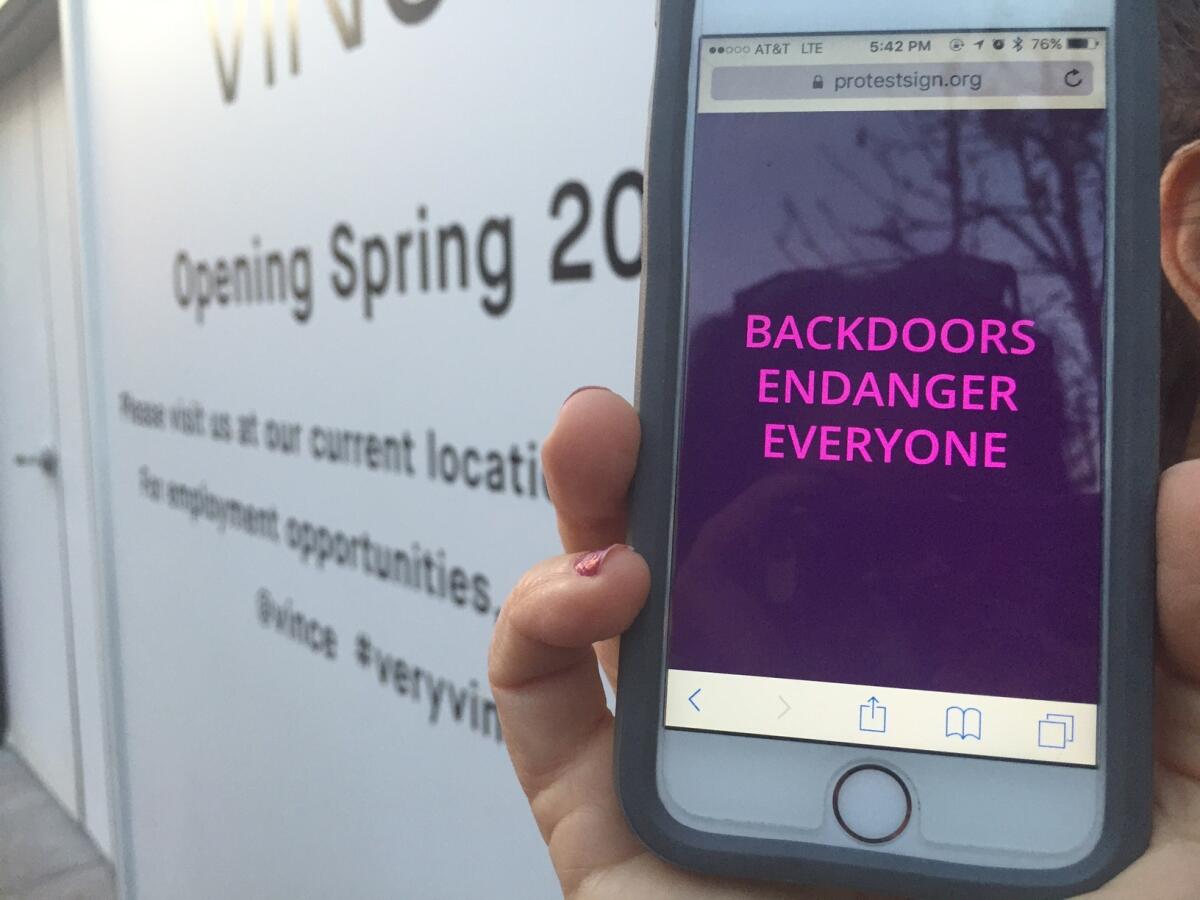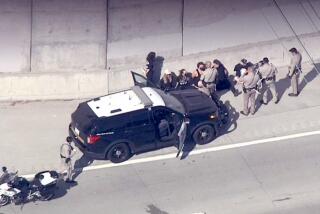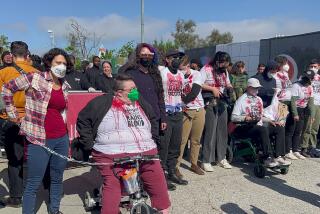Apple vs. FBI: Protesters gather at the Grove in support of tech giant’s defiance

A demonstrator outside the Apple store at the Grove shows a “digital sign” in support of Apple’s resistance to help the FBI.
- Share via
Demonstrations across the nation on Tuesday drew supporters of Apple for defying a court order and refusing to help the FBI unlock the San Bernardino gunman’s iPhone.
Coordinated by a group called Fight for the Future, which has held protests on other tech issues, the protests were organized in San Francisco, Los Angeles, Apple’s Silicon Valley headquarters and FBI headquarters in Washington, among other locations.
Outside the Apple store at the Grove shopping center, about a dozen people carried posters and “digital signs” on their Apple devices with such slogans as, “Secure phones save lives.”
The number of protesters, however, paled in comparison to the number of shoppers inside, and by 6:30 p.m., they numbered only nine.
Laura Borst, carrying a sign that stated, “Don’t break our phones,” said she was concerned that the FBI’s position left her and others vulnerable to identity theft.
“The government is exploiting this terrible tragedy to do surveillance,” she said. “I don’t think it’s against the victims’ memory to maintain privacy.”
The FBI and Apple have been engaged in a tense standoff over whether the tech giant should help unlock San Bernardino shooter Syed Rizwan Farook’s iPhone 5c.
The public dispute was triggered by U.S. Magistrate Judge Sheri Pym’s Feb. 16 order that Apple assist the FBI in unlocking the phone. Hours later, Apple Chief Executive Tim Cook released an open letter to Apple customers, saying the company would resist the judge’s order.
He described the federal government’s request as tantamount to constructing “a backdoor to the iPhone,” which Apple considers “too dangerous to create.”
In the following days, elected officials and rival tech companies joined the fray, with Rep. Ted Lieu (D-Los Angeles) on Tuesday calling for Congress, not a judge, to resolve the debate raised by ever-evolving technology.
Cook said Monday in a letter to employees that the FBI’s request was about more than a single investigation, but a test case with far-reaching consequences.
“At stake is the data security of hundreds of millions of law-abiding people, and setting a dangerous precedent that threatens everyone’s civil liberties,” Cook said in his letter.
The chief executive’s remarks follow a publicly released statement by FBI Director James Comey, who said Sunday that the scale of the San Bernardino attacks, which left 14 people dead and 22 injured, warranted the pursuit of all leads, including the contents of Farook’s phone.
“I hope folks will take a deep breath and stop saying the world is ending, but instead use that breath to talk to each other,” Comey said.
“We simply want the chance, with a search warrant, to try to guess the terrorist’s passcode without the phone essentially self-destructing and without it taking a decade to guess correctly. That’s it,” Comey said. “We don’t want to break anyone’s encryption or set a master key loose on the land.”
At the protest outside the Grove, Nicholas Linindoll, 34, said that he “cherished” the right to privacy and that the FBI’s investigation shouldn’t compromise every iPhone user’s privacy.
“I honestly don’t think this work phone will yield any information,” said Linindoll, a West L.A resident who works in Web development.
“If it did, this is bigger than that. We need to be able to protect security around the world of all Americans.”
For breaking news in California, follow @SarahParvini and @MattHjourno.
More to Read
Sign up for Essential California
The most important California stories and recommendations in your inbox every morning.
You may occasionally receive promotional content from the Los Angeles Times.












